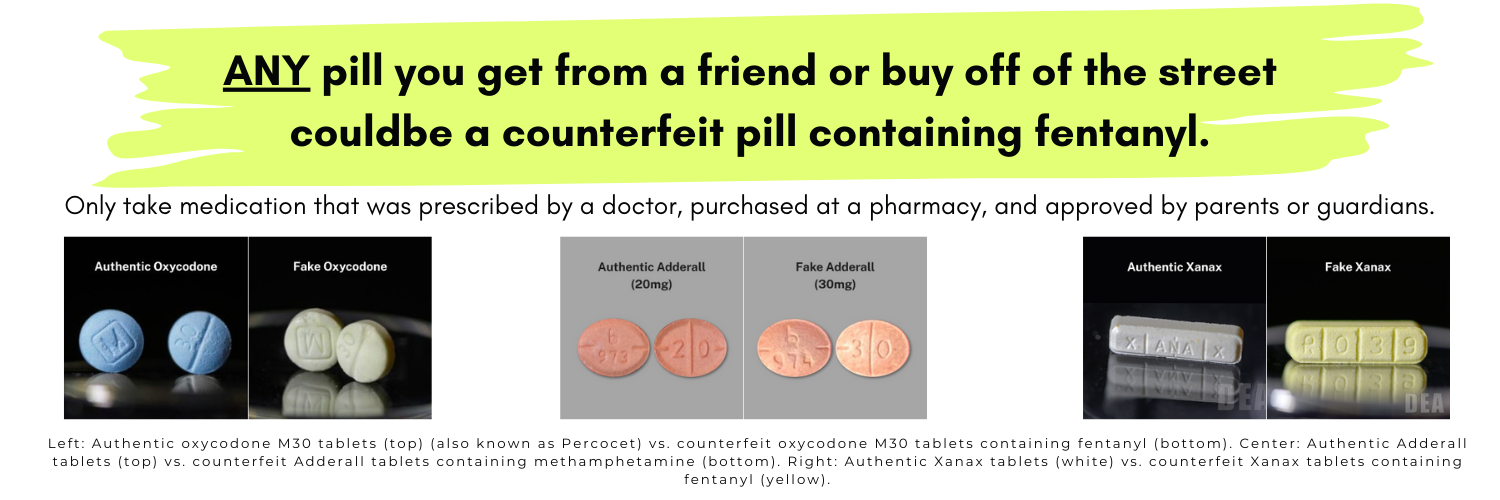- Taylor Independent School District
- Fentanyl Facts
Safety & Security
Page Navigation
-

There is a growing threat in Central Texas to the health and safety of our children that we want to bring to your attention. One Central Texas District experienced six student deaths in the last year and over a dozen overdoses. Governor Greg Abbott launched a statewide “One Pill Kills” campaign to raise awareness of the deadly synthetic opioid fentanyl. Fentanyl is now the number one cause of overdose deaths in the country. Texas saw an 89 percent increase in fentanyl-related fatalities last year. Almost 1,700 Texans lost their lives because of fentanyl compared to 883 in 2020. In the past year, Texas law enforcement alone has seized over 342 million lethal doses of fentanyl. Taylor ISD urges families to get informed and talk to their kids about the dangers of drug use, including fentanyl.
What are the facts?
-
Fentanyl is a synthetic opioid that is about 100 times more potent than morphine, is highly addictive and is deadly.
-
It’s tasteless, odorless, and an amount about the size of two grains of salt can cause overdose. It is often mixed into powders and counterfeit pills.
-
You can’t tell if drugs contain fentanyl by look, taste, smell, or touch.

How does Taylor ISD support our families?
-
The state requires school districts to provide instruction in alcohol and drug prevention.
-
Middle and high school students receive lessons that include information about fentanyl and healthy alternatives to drug and alcohol use.
What can I do to help keep my child safe?
-
Start a conversation with your child. Young people are more likely to listen when they know you’re on their side. Reinforce why you don’t want your child to drink or use other drugs—because you want your child to be happy and safe. Talk to your teen. Talk about the dangers that they may face at parties and social events. Let them know that they can talk to you about things that are concerning them.
-
Monitor their social media and app usage. This is a common way that teens get access to this drug.
-
Encourage your teen to get involved with extracurricular activities, church, service projects, community, and school organizations. Keeping your teen involved can help battle loneliness, isolation, and hopelessness.
-
Monitor your child’s behavior. Has their behavior changed lately? Do they have a new set of “friends”? Are they keeping to themselves more often than usual?
-
Seek help if your child is facing a mental health challenge or if you suspect they are using any substance.
Need additional help?
-
Our school counselors offer general counseling and referrals to other agencies in our community.
-
Both Travis County and Williamson County offer free substance abuse resources.
-
The website drugfree.org/addiction-education has helpful resources.
Report any suspicion that Fentanyl use may be occurring in the schools or that someone may be abusing it. Encourage your child to do the same. You could save a life.

-
-

To help fight the fentanyl problem, Taylor ISD is:
- Partnering with local law enforcement, emergency management, and health authorities to monitor and collaborate on the best way to combat the crisis.
- The district stocks Narcan at all campuses – through the nurses’ offices and school resource officers (SROs). Narcan, administered quickly enough, can help reverse the effects of a fentanyl overdose.
- District nursing staff, counselors, safety and security team, curriculum and instruction leaders, and our principals and campus leaders will be working on in-school educational opportunities, which may include assemblies, homeroom discussions, posters, or other ways to inform students about fentanyl dangers.
-


To help fight the fentanyl problem, you can:
- Talk to your children. Tell them that ANY pill they get from a friend or purchased online or off of the street could be a counterfeit pill containing fentanyl. Only take medication that was prescribed by a doctor, purchased at a pharmacy, and approved by parents or guardians.
- Learn about the fentanyl crisis and help spread the word that this is a dangerous situation. Visit the Centers for Disease Control website’s Fentanyl Facts page as a starting-point: https://www.cdc.gov/stopoverdose/fentanyl/index.html)
- Ensure that your child delivers all medications, including over-the-counter medications, to the school nurse for distribution. Students should not carry any medications with them at school, nor share them for any reason.
- Reach out to your school nurse or counselor with any specific concerns, or if you need additional resources that are unique to your family.
-

Parent Tips
- It is best to have an open conversation with your children as soon as possible. Stick to the facts about why fentanyl is so dangerous - that they won’t know whether the pills they are purchasing are laced with fentanyl and with how much fentanyl.
- Stress that your children can turn to you for support no matter what happens.
- Educating your children about NARCAN is critical.
- It is important to recognize that your child may be experiencing emotional, mental and physical pain. Opioids numb youth to this pain.
- Spending time with children, having fun with them, helping them to talk about how they are feeling and seeking healthy ways to address their feelings are all good and important.
- Fentanyl is incredibly scary - talking with other parents for support and educating yourself can be helpful.
Links & Resources for Parents
- https://publichealthinsider.com/2021/12/02/talking-with-teens-about-fentanyl/#:~:text=An%20effective%20conversation%20with%20youth,risk%20to%20just%20tune%20out.
- https://open.alberta.ca/dataset/f4e8bdd7-640d-4f3e-afe3-9a4963b029f1/resource/fc5ddc1e-663e-4aed-9c27-e387bdd8be7b/download/fentanyl-information-parents-teachers-2016.pdf
- https://nida.nih.gov/publications/opioids-facts-parents-need-to-know/starting-conversation
- https://health.choc.org/what-parents-should-know-about-fentanyl/
- https://www.childrens.com/health-wellness/fentanyl-use-and-teens
- https://www.getsmartaboutdrugs.gov/family/10-strategies-prevent-your-young-person-using-drugs
- https://www.getsmartaboutdrugs.gov/sites/getsmartaboutdrugs.com/files/publications/GrowingUpDrugFree%28Final-508%29%282017%29.pdf
- https://safesupportivelearning.ed.gov/events/webinar/lessons-field-webinar-part-2-preventing-and-addressing-fentanyl-use

